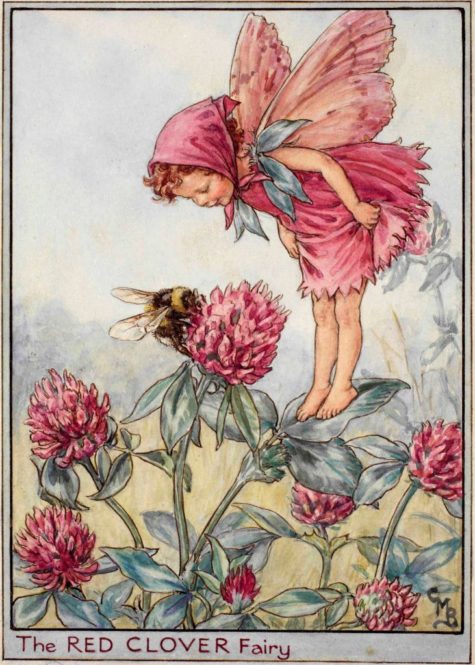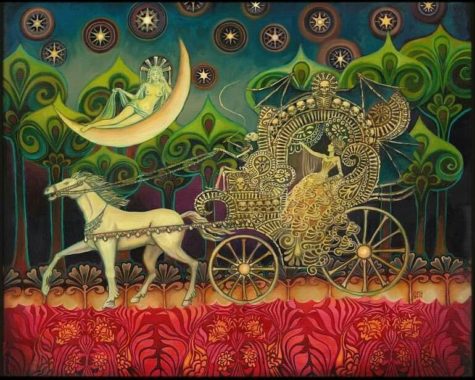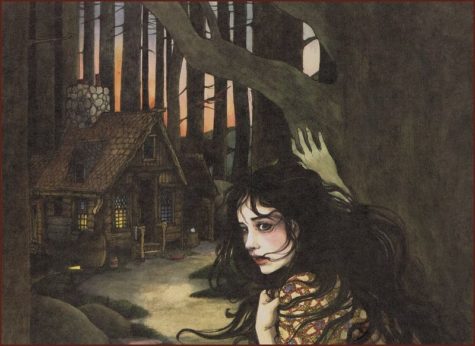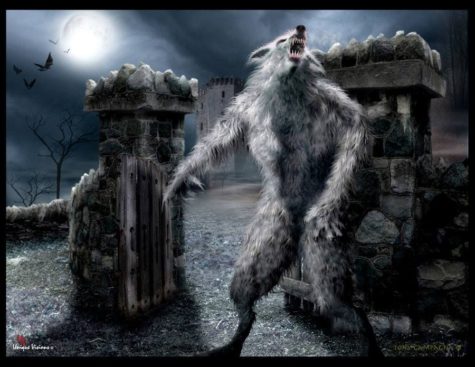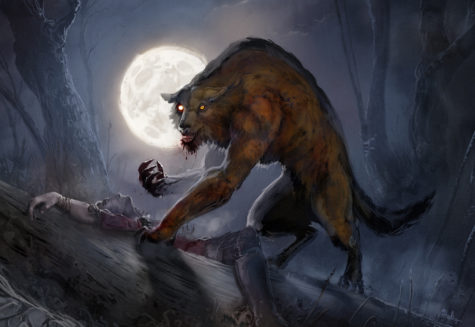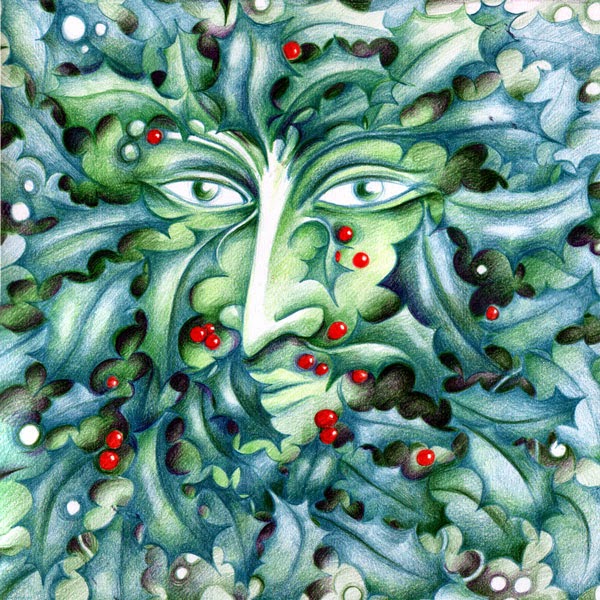The Red Clover Fairy
White Clover Fairy
Hymn To Selene
Hear, goddess queen (thea basileia), diffusing silver light, bull-horned, and wandering through the gloom of night.
With stars surrounded, and with circuit wide night’s torch extending, through the heavens you ride: female and male, with silvery rays you shine, and now full-orbed, now tending to decline.
Mother of ages, fruit-producing Mene (Moon), whose amber orb makes night’s reflected noon: lover of horses, splendid queen of night, all-seeing power, bedecked with starry light, lover of vigilance, the foe of strife, in peace rejoicing, and a prudent life: fair lamp of night, its ornament and friend, who givest to nature’s works their destined end.
Queen of the stars, all-wise Goddess, hail! Decked with a graceful robe and amble veil.
Come, blessed Goddess, prudent, starry, bright, come, moony-lamp, with chaste and splendid light, shine on these sacred rites with prosperous rays, and pleased accept thy suppliants’ mystic praise.
Orphic Hymn 9 ~
Fumigation from Aromatics
To Selene
O goddess of the Moon,
Silver-haired and lonely
Shining in the depths of Universe.
Selene, in your chariot
That enkindles the night
And brings light to darkness
You travel through the sky.
May you again speak to your beloved
Endymion, sunk in everlasting sleep,
May he once awake and rub
Sorrowful tears out of your face
So that you will look upon us
With smiling eyes.
I praise and honour you,
Bless me and show me the way
In this journey of mine.
~Eremites Plato
A Warrior’s Creed
I have no parents ~
I make the heavens and earth my parents.
I have no home ~
I make awareness my home.
I have no life or death ~
I make the tides of breathing my life and death.
I have no divine power ~
I make honesty my divine power.
I have no means ~
I make understanding my means.
I have no magic secrets ~
I make character my magic secret.
I have no body ~
I make endurance my body.
I have no eyes ~
I make the flash of lightning my eyes.
I have no ears ~
I make sensibility my ears.
I have no limbs ~
I make promptness my limbs.
I have no strategy ~
I make “unshadowed by thought” my strategy.
I have no designs ~
I make “seizing opportunity by the forelock” my design.
I have no miracles ~
I make right action my miracle.
I have no principles ~
I make adaptability to all circumstances my principles.
I have no tactics ~
I make emptiness and fullness my tactics.
I have no friends ~
I make my mind my friend.
I have no enemy ~
I make carelessness my enemy.
I have no armor ~
I make benevolence and righteousness my armor.
I have no castle ~
I make immovable-mind my castle.
I have no sword ~
I make absence of self my sword.
~Anonymous Samurai, 14th century.
The Lycanthropous Flower
From the book Werwolves, by Elliott O’Donnell, first published in 1912, we have this account of the case of the family of Kloska and the Lycanthropous flower.
In the mountainous regions of Austria-Hungary and the Balkan Peninsula are certain flowers credited with the property of converting into werewolves whoever plucks and wears them. Needless to say, these flowers are very rare, but I have heard of their having been found, comparatively recently, both in the Transylvanian Alps and the Balkans.
A story a propos of one of these discoveries was told me last summer.
Ivan and Olga were the children of Otto and Vera Kloska – the former a storekeeper of Kerovitch, a village on the Roumanian side of the Transylvanian Alps. One morning they were out with their mother, watching her wash clothes in a brook at the back of their house, when, getting tired of their occupation, they wandered into a thicket.
“Let’s make a chaplet of flowers,” Olga said, plucking a daisy. “You gather the flowers and I’ll weave them together.”
“It’s not much of a game,” Ivan grumbled, “but I can’t think of anything more exciting just now, so I’ll play it. But let’s both make wreaths and see which makes the best.”
To this Olga agreed, and they were soon busily hunting amidst the grass and undergrowth, and scrambling into all sorts of possible and impossible places.
Presently Ivan heard a scream, followed by a heavy thud, and running in the direction of the noise, narrowly avoided falling into a pit, the sides of which were partly overgrown with weeds and brambles.
“It’s all right,” Olga shouted; “I’m not hurt. I landed on soft ground. It’s not very deep, and there’s such a queer flower here – I don’t know what it is; I’ve never seen one like it before.”
Ivan’s curiosity thus aroused, he carefully examined the sides of the pit, and, selecting the shallowest spot, lowered himself slowly over and then dropped. It was nothing of a distance, seven or eight feet at the most, and he alighted without mishap on a clump of rank, luxuriant grass. “See! here it is,” his sister cried, pointing to a large, very vivid white flower, shaped something like a sunflower, but soft and pulpy, and full of a sweet, nauseating odour. “It’s too big to put in a wreath, so I’ll wear it in my buttonhole.”
“Better not,” Ivan said, snatching it from her; “I don’t like it. It’s a nasty-looking thing. I believe it’s a sort of fungus.”
Olga then began to cry, and as Ivan was desirous of keeping the peace, he gave her back the flower. She was a prepossessing child, with black hair and large dark eyes, pretty teeth and plump, sunburnt cheeks. Nor was she altogether unaware of her attractions, for even at so early an age she had a goodly share of the inordinate vanity common to her sex, and liked nothing better than appearing out-of-doors in a new frock plentifully besprinkled with rosettes and ribbons.
The flower, she told herself, would look well on her scarlet bodice, and would be a good set-off to her black hair and olive complexion. All this was, of course, beyond the comprehension of Ivan, who regarded his sister’s weakness with the most supreme contempt, and for his own part was never so happy as when skylarking with other boys and getting into every conceivable kind of mischief. Yet for all that he was in the main sensible, almost beyond his years, and extremely fond, and – though he would not admit it – proud of Olga.
She fixed the flower in her dress, and imitating to the best of her knowledge the carriage of royalty, strutted up and down, saying “Am I not grand? Don’t I look nice? Ivan – salute me!”
And Ivan was preparing to salute her in the proper military style, taught him by a great friend of his in the village, a soldier in the carabineers for whom he had an intense admiration, when his jaw suddenly fell and his eyes bulged.
“Whatever is the matter with you?” Olga asked.
“There’s nothing the matter with me,” Ivan cried, shrinking away from her; “but there is with you. Don’t! don’t make such faces – they frighten me,” and turning round, he ran to the place where he had made his descent and tried to climb up.
Some minutes later the mother of the children, hearing piercing shrieks for help, flew to the pit, and, missing her footing, slipped over the brink, and falling some ten or more feet, broke one of her legs and otherwise bruised herself.
For some seconds she was unconscious, and the first sight that met her eyes on coming to was Ivan kneeling on the ground, feebly endeavoring to hold at bay a gaunt grey wolf that had already bitten him about the legs and thigh, and was now trying hard to fix its wicked white fangs into his throat.
“Help me, mother!” Ivan gasped; “I’m getting exhausted. It’s Olga.”
“Olga!” the mother screamed, making frantic efforts to come to his assistance. “Olga! what do you mean?”
“It’s all owing to a flower – a white flower,” Ivan panted; “Olga would pluck it, and no sooner had she fixed it on her dress than she turned into a wolf! Quick, quick! I can’t hold it off any longer.”
Thus adjured the wretched woman made a terrific effort to rise, and failing in this, clenched her teeth, and, lying down, rolled over and over till she arrived at the spot where the struggle was taking place. By this time, however, the wolf had broken through Ivan’s guard, and he was now on his back with his right arm in the grip of his ferocious enemy.
The mother had not a knife, but she had a long steel skewer she used for sticking into a tree as a means of fastening one end of her washing line. She wore it hanging to her girdle, and it was quite by a miracle it had not run into her when she fell.
“Take care, mother,” Ivan cried, as she raised it ready to strike; “remember, it is Olga.”
This indeed was an ugly fact that the woman in her anxiety to save the boy had forgotten. What should she do? To merely wound the animal would be to make it ten times more savage, in which case it would almost inevitably destroy them both. To kill it would mean killing Olga. Which did she love the most, the boy or the girl?
Never was a mother placed in such a dilemma. And she had no time to deliberate, not even a second. God help her, she chose. And like ninety-nine out of a hundred mothers would have done, she chose the boy; he – he at all costs must be saved. She struck, struck with all the pent-up energy of despair, and in her blind, mad zeal she struck again.
The first blow, penetrating the werewolf’s eye, sank deep into its brain, but the second blow missed – missed, and falling aslant, alighted on the form beneath.
An hour later a villager on his way home, hearing extraordinary sounds of mirth, went to the side of the pit and peeped over.
“Vera Kloska!” he screamed; “Heaven have mercy on us, what have you there?”
“He! he! he!” came the answer. “He! he! he! My children! Don’t they look funny? Olga has such a pretty white flower in her buttonhole, and Ivan a red stain on his forehead. They are deaf – they won’t reply when I speak to them. See if you can make them hear.”
But the villager shook his head. “They’ll never hear again in this world, mad soul,” he muttered. “You’ve murdered them.”
The Fox Wedding
“Once upon a time there was a young white fox, whose name was Fukuyemon. When he had reached the fitting age, he shaved off his forelock and began to think of taking to himself a beautiful bride. The old fox, his father, resolved to give up his inheritance to his son, and retired into private life; so the young fox, in gratitude for this, labored hard and earnestly to increase his patrimony.
Now it happened that in a famous old family of foxes there was a beautiful young lady-fox, with such lovely fur that the fame of her jewel-like charms was spread far and wide. The young white fox, who had heard of this, was bent on making her his wife, and a meeting was arranged between them. There was not a fault to be found on either side; so the preliminaries were settled, and the wedding presents sent from the bridegroom to the bride’s house, with congratulatory speeches from the messenger, which were duly acknowledged by the person deputed to receive the gifts; the bearers, of course, received the customary fee in copper cash.
When the ceremonies had been concluded, an auspicious day was chosen for the bride to go to her husband’s house, and she was carried off in solemn procession during a shower of rain, the sun shining all the while. After the ceremonies of drinking wine had been gone through, the bride changed her dress, and the wedding was concluded, without let or hindrance, amid singing and dancing and merry-making.
The bride and bridegroom lived lovingly together, and a litter of little foxes were born to them, to the great joy of the old grandsire, who treated the little cubs as tenderly as if they had been butterflies or flowers. “They’re the very image of their old grandfather,” said he, as proud as possible. “As for medicine, bless them, they’re so healthy that they’ll never need a copper coin’s worth!”
As soon as they were old enough, they were carried off to the temple of Inari Sama, the patron saint of foxes, and the old grand-parents prayed that they might be delivered from dogs and all the other ills to which fox flesh is heir.
In this way the white fox by degrees waxed old and prosperous, and his children, year by year, became more and more numerous around him; so that, happy in his family and his business, every recurring spring brought him fresh cause for joy. “
~From Algernon Freeman-Mitford’s Tales of Old Japan, 1910
I Am The Mother
This is a great little chant to connect with the Goddess, the Elements.

I am the Air that shakes the trees,
I am the Mother.
I am the Air that shakes the trees
I am the Mother
I and the Air that shakes the trees,
Storming gale or gentle breeze.
I am the Air that shakes the trees,
I am the Mother.
I am the Fire burning bright,
I am the Mother.
I am the Fire burning bright,
I am the Mother.
I am the Fire burning bright,
Candle flame or noontime’s light.
I am the Fire burning bright,
I am the Mother.
I am the Water flowing deep,
I am the Mother.
I am the Water flowing deep,
I am the Mother.
I am the Water flowing deep,
Crystal pool or torrent’s leap.
I am the Water flowing deep,
I am the Mother.
I am the Earth standing strong,
I am the Mother.
I am the Earth standing strong,
I am the Mother.
I am the Earth standing strong
Caverns deep or hillsides long.
I am the Earth standing strong,
I am the Mother.
Earth, Water, Fire, and Air,
I am the Mother.
Earth, Water, Fire, and Air,
I am the Mother.
Earth, Water, Fire and Air,
Call my name and I’ll be there.
Earth, Water, Fire and Air,
For I am the Mother.
Source unknown
Another Case of Lycanthropy
From the book Werwolves, by Elliott O’Donnell, first published in 1912, we have this account of the case of a Lycanthropous brook in the Harz Mountains.
Another case of lycanthropy in Germany, connected with the Harz Mountains, occurred somewhere about the beginning of the last century.
Count Von Breber, chief of the police of Magdeburg, whilst away from home on a holiday with his young and beautiful wife, the Countess Hilda, happened to pass a night in the village of Grautz, in the centre of the Harz Mountains.
In the course of a conversation with the innkeeper, the Countess remarked: “On our way here this morning we crossed a brook, and experienced the greatest difficulty in persuading our dogs to go into the water. It is most unusual, as they are generally only too ready for a dip. Can you in any way account for it?”
“Were there two very tall poplars, one on either side of the brook?” the innkeeper asked; “and did you notice a peculiar – one cannot describe it as altogether unpleasant – smell there?”
“We did!” the Count and Countess exclaimed in chorus.
“Then it was the spot locally known as Wolf Hollow,” the innkeeper said. “No one ventures there after dark, as it has a very evil reputation.”
“Stuff and nonsense!” the Count snapped.
“That is as your honour pleases,” the innkeeper said humbly. “We village folk believe it to be haunted; but, of course, if the subject appears ridiculous to you, I will take care I do not refer to it again.”
“Please do!” the Countess cried. “I love anything to do with the supernatural. Tell us all about it.”
The innkeeper gave a little nervous cough, and glancing uneasily at the Count, whose face looked more than usually stern in the fading sunlight, observed: “They do say, madam, that whoever drinks the water of that stream…”
“Yes, yes?” the Countess cried eagerly.
“Suffers a grave misfortune.”
“Of what nature?” the Countess demanded; but before the innkeeper could answer, the Count cut in:
“I forbid you to say another word. The Countess has drunk the water there, and your cock-and-bull stories will frighten her into fits. Confess it is all made up for the benefit of travellers like ourselves.”
“Yes, your honour!” the innkeeper stammered, his knees shaking; “I confess it is mere talk, but we all be – be – lieve it.”
“That will do – go!” the Count cried; and the innkeeper, terrified out of his wits, flew out of the room.
Some minutes later mine host received a peremptory summons to appear before the Count, who was alone and scowling horribly, in the best parlour. He had barely got inside the room before the Count burst out wrathfully:
“I’ve sent for you, sir, in order to impress upon you the fact that if either you or your minions mention one word about that brook to the Countess, or to her servants – mark that – I will have the breath flogged out of your body and your tongue snipped. Do you hear?”
“Y – yes, your honour,” the innkeeper cried. “I ful – fully un – understand, and if her ladyship asks me any – anything abou – out the br – br – brook, I will lie.”
“Which won’t trouble you much, eh?”
“N – n – o, your honour! I mean y – yes, your honour! It will be a burden on my con – conscience, but I will do anything to pl – please your honour.”
The interview then terminated, and the innkeeper, bathed in perspiration and wishing his lot in life anything but what it was, hastened to prepare dinner.
“I hope nothing dreadful will happen to me; I feel that something will,” the Countess said, as she let down her long beautiful hair that night. “Carl, why did you let me drink the water?”
“The water be – – !” the Count growled. “Didn’t you hear what the innkeeper said? – that the story was mere invention! If you believe all the idle tales you hear, you will soon be in an asylum. Hilda, I’m ashamed of you!”
“And I’m ashamed of myself,” the Countess cried, “so there!” and she flung her arms round his neck and kissed him.
The following morning they left the inn, and, retracing their steps, journeyed homewards. The Count looked at his wife somewhat critically; she was very pale, and there were dark rims under her eyes.
“I do believe, Hilda,” he observed with an assumed gaiety, “you are still worrying about that water!”
“I am,” she replied; “I had such queer dreams.”
He asked her to narrate them, but she refused; and as her sleep now became constantly disturbed, and she was getting thin and worried, the Count determined that as soon as he reached home he would call in a doctor. The latter, examining the Countess, attributed the cause of her indisposition to dyspepsia, and ordered her a diet of milk food. But she did not get better, and now insisted upon sleeping alone, choosing a bedroom situated in a secluded part of the house, where there was absolute silence.
The Count remonstrated. “You might at least let me occupy the room next to you!” he said.
“No,” she replied; “I should hear you if you did. I am sensible now of the very slightest sounds, and besides disturbing me, they are a source of the greatest annoyance. I feel I shall never get well again unless I can have complete rest and quiet. Do let me!” and she fixed her big blue eyes on him so earnestly, that he vowed he would see that all her wishes, no matter how fanciful, were gratified.
“I hope she won’t go mad!” he said to himself; “her behaviour is odd, to say the least of it. Odd! – wholly inexplicable.”
It was rather too bad that just now, when his mind was harassed with misgivings at home, he should also be bothered with disturbances outside his own home. But so it was. Events of an unprecedented nature were taking place in the town, and it fell to his lot to cope with them. Night after night children – mostly of the poorer class – disappeared, and despite frantic yet careful and thorough searches, no clue as to what had befallen them had, so far, been discovered.
The Count doubled the men on night duty, but in spite of these and other extraordinary precautions the disappearances continued, and the affair – already of the utmost gravity – promised to be one that would prove disastrous, not merely to the heads of families, but to the head of the police himself.
So long as the missing ones had been of the lower orders only, the Count had not had much to fear – the murmurings of their parents could easily be held in check – but now that a few of the children of the rich had been spirited away, there was every likelihood of the matter reaching the ears of the Court.
One evening, when the Count had hardly recovered his equanimity after a stormy interview with Herr Meichen, the banker, whose three-year-old daughter had vanished, and a still more distressing scene with Otto Schmidt, the lawyer, whose six-year-old daughter had disappeared, his patience was called upon to undergo a still further trial in consequence of a visit from General Carl Rittenberg, a person of the greatest importance, not only in the town, but in the whole province. Purple in the face with suppressed fury, the General burst into the room where the head of the police sat.
“Count!” he cried, striking the table with his fist, “this is beyond a joke. My child – my only child – Elizabeth, whom my wife and I passionately love, has been stolen. She was walking by my side in Frederick Street this afternoon, and as it suddenly became foggy, I left her a moment to hail a vehicle to take us home. I wasn’t gone from her more than half a minute at the most, but when I returned she had gone.
I searched everywhere, shouting her name; and passers by, compassionate strangers, joined me in my search; but though we have looked high and low not a trace of her have we been able to discover. I have not told her mother yet. God help me – I dare not! I dare not even show my face at home without her – my wife will never forgive me – – “; and so great was his emotion that he buried his face in his hands, and his great body heaved and shook.
Then he started to his feet, his eyes bulging and lurid. “Curse you!” he shrieked; “curse you, Count! it’s all your fault! Day after day you’ve sat here, when you ought to have been hunting up these rascally police of yours. You’ve no right to rest one second – not one second, do you hear? – till the mystery surrounding these poor lost children has been cleared up, and, living or dead – God forbid it should prove to be the latter! – they are restored to their parents.
“Now, mark my words, Count, unless my child Elizabeth is found, I’ll make your name a byword throughout the length and breadth of the country – I’ll – – “; but words failed him, and, shaking his fist, he staggered out of the room.
The Count was much perturbed. The General was one of the few people in the town who really had it in their power to do him harm – the one man above all others with whom he had hitherto made it his business to keep in. He had not the least doubt but that the General meant all he said, and he recognized only too well that his one and only hope of salvation lay in the recovery of Elizabeth. But, God in heaven, where could he look for her?
Sick at heart, he marshaled every policeman in the force, and within an hour every street in Magdeburg was being subjected to a most rigorous search. The Count was just quitting his office, resolved to join in the hunt himself, when a shabbily dressed woman brushed past the custodian at the door, and racing up to him, flung herself at his feet.
“What the devil does she want?” the Count demanded savagely. “Who is she?”
“Martha Brochel, your honour, a poor half-witted creature, who was one of the first in the town to lose a child,” the door-porter replied; “and the shock of it has driven her mad!”
“Mad! mad! Yes! that is just what I am – mad!” the woman broke out. “Everything is in darkness. It is always night! There are no houses, no chimneys, no lanterns, only trees – big, black trees that rustle in the wind, and shake their heads mockingly. And then something hideous comes! What is it? Take it away! Take it away! Give her back to me!” And as Martha’s voice rose to a shriek, she threw her hands over her head, and, clenching them, growled and snarled like a wild animal.
“Put her outside!” the Count said with an impatient gesture; “and take good care she does not get in here again.”
“No! Don’t turn me away! Don’t! don’t!” Martha screamed; “I forgot what it was I wanted to tell you – but I remember now. I’ve seen it! – seen the thing that stole my child. There is light – light again! Oh! hear me!”
“Where have you seen it, Martha?” the porter inquired; and looking at the Count, he said respectfully: “It is just possible, your honour, this woman might be of use to us, and that she has actually seen the person who stole her child.”
“Rubbish! What right has she to have children?” the Count snapped, and he spurned the supplicant with his boot.
The moment she was in the street, however, the head of the police was after her. Keeping close behind her, he resolutely dogged her steps. The evening was now far advanced, and the fog so dense that the Count, though he knew the city, was soon at a total loss as to his whereabouts. But on and on the woman went, now deviating to the right, now to the left; sometimes pausing as if listening, then tearing on again at such a rate that the Count was obliged to run to keep up with her. Suddenly she uttered a shrill cry:
“There it is! There it is! The thing that took my child!” and the figure of what certainly appeared to be a woman, muffled, and carrying a sack on her shoulder, glided across the road just in front of them and disappeared in the impenetrable darkness. Martha sped after her, and the Count, his hopes raised high, followed in hot pursuit. He failed to recognize the ground they were traversing, and presently they came to a high wall, over which Martha scrambled with the agility of an acrobat.
The Count, in attempting to imitate her, damaged his knee and tore his clothes, but he also landed safely on the other side. Then on they went, Martha with unabated energy, the Count horribly exhausted, and beginning to think of turning back, when they were abruptly brought to a standstill. The walls of some building loomed right ahead of them. The object of their pursuit, again visible, darted through a doorway; whilst Martha, with a loud cry of triumph, sprang in after her; but before the Count could cross the threshold the door was slammed and locked in his face.
Then he heard a chorus of the most appalling sounds – sounds so strange and unearthly that his blood turned to ice and his hair rose straight on end. Rushing footsteps mingled with peculiar soft patterings; agonized human screams coupled with the growls and snappings of an animal; a heavy thud; gurgles; and then silence.
The Count’s courage revived: he hurled himself against the door; it gave with a crash, and the next moment he was inside. But what a sight met his eyes! The place, which somehow or the other seemed oddly familiar to him, was a veritable shambles – floor, walls, and furniture were sodden with blood. In every corner were mangled human remains; whilst stretched on the ground, opposite the doorway, lay the body of Martha, her face unrecognizable and her breast and stomach ripped right open.
This was terrible enough, but more terrible by far was the author of it all, who, having cast aside wraps, now stood fully revealed in the yellow glow of a lantern. What the Count saw was a monstrosity – a thing with a woman’s breast, a woman’s hair, golden and curly, but the face and feet were those of a wolf; whilst the hands, white and slender, were armed with long, glittering nails, cruelly sharp and dripping with blood.
To the Count’s astonishment the creature did not attack him, but uttering a low plaintive cry, veered round and endeavoured to escape. But escape was the very last thing Van Breber would permit. Whatever the thing was – beast or devil – it had caused him endless trouble, and if allowed to get away now, would go on with its escapades, and so bring about his ruin.
No! he must kill it. Kill it even at the risk of his own life. With a shout of wrath he plunged his sword up to its hilt in the thing’s back.
It fell to the floor and the Count bent over it curiously. Something was happening – something strange and terrifying; but he could not look – he was forced to shut his eyes. When he opened them he no longer saw the hairy visage of a wolf – he was gazing fondly into the dying eyes of his beautiful and much-loved wife. With a rapidity like lightning, he recognized his surroundings. He was in a long disused summer-house that stood in a remote corner of his own grounds!
“God help me and you, too!” the Countess Hilda whispered, clasping him fondly in her arms. “It was the water! – the water I drank in the Harz Mountains! I have been bewitched…”; and kissing him feverishly on the lips, she sank back – dead.
The Harz Mountain Werewolves
From the book Werwolves, by Elliott O’Donnell, first published in 1912, we have this account of the case of Herr Hellen and the Werewolves of the Harz Mountains.
Two gentlemen, named respectively Hellen and Schiller, were on a walking tour in the Harz Mountains, in the early summer of the year 1840, when Schiller, slipping down, sprained his ankle and was unable to go on. They were some miles from any village, in the centre of an extensive forest, and it was beginning to get dark.
“Leave me here,” cried the injured man to his friend, “while you see if you can discover any habitation. I have been told these woods are full of charcoal-burners’ and wood-cutters’ huts, so that if you walk straight ahead for a mile or two, you are very likely to come across one. Do go, there’s a good fellow, and if you are too tired to return yourself, send some one to carry me.”
Hellen did not like leaving his comrade in such a dreary spot, alone and helpless, but as Schiller was persistent he at length yielded, and stepping briskly out, advanced along the track that had brought them hither. Once or twice he halted, fancying he heard voices, and several times his heart pulsated wildly at what he took to be the cry of a wolf – for neither Schiller nor he had no weapons excepting sheath-knives.
At last he came to an open spot hedged in on all sides by gloomy pines, the shadows from which were beginning to fall thick and fast athwart the vivid greensward. It was one of those places – they are to be found in pretty nearly every country – studiously avoided by local woodsmen as the haunt of all manner of evil influences.
Hellen recognized it as such the moment he saw it, but as it lay right across his path, and time was pressing, he had no alternative but to keep boldly on. He was half-way across the spot when he was startled by a groan, and looking in the direction of the sound, he saw a man seated on the ground endeavouring to bandage his hand. Wondering why he had not observed him before, but thankful to meet some one at last, Hellen went up to him and asked what was the matter.
“I’ve broken my wrist,” the man replied. “I was gathering sticks for my fire to-morrow when I heard the howl of a wolf, and in my anxiety to escape a conflict with the brute I climbed this tree. As I descended one of the branches gave way, and I fell down with all my weight on my right arm. Will you see if you can bind it for me? I’m a bit awkward with my left hand.”
“I will do my best,” Hellen said, and kneeling beside the man, he took off the bandages and wrapped them round again. “There,” he exclaimed, “I think that is better – at least it is the best I can do.”
The stranger was now most profuse in his thanks, and when Hellen informed him of Schiller’s condition, at once cried out, “You must both come to my cottage; it is only a short distance from here. Let us hasten thither now, and my daughter, who is very strong, shall go back with you and help you carry your friend. We are not rich, but we can make you both fairly comfortable, and all we have shall be at your disposal. But I wonder if you know what you have incurred by coming to this spot at this hour?”
“Why, no,” Hellen said, laughing. “What?”
“The gratification of two wishes – the first two wishes you make! Of course, you will say it is all humbug, but, believe me, very queer things do happen in this forest. I have experienced them myself.”
“Well!” Hellen replied, laughing more heartily than before, “if I wish anything at all it is that my wife were here to see how beautifully I have bandaged your wrist.”
“Where is your wife?” the stranger inquired.
“At Frankfort, most likely taking a final peep at the children in bed before retiring to rest herself!” Hellen said, still laughing.
“Then you have children!” the stranger ejaculated, evidently interested.
“Yes, three – all girls – and such bonny girls, too. Marcella, Christina, and Fredericka. I wish I had them here for you to see.”
“I should much like to see them, certainly,” the stranger said. “And now you have told me so much of interest about yourself, let me tell you something of my own history in exchange. My name is Wilfred Gaverstein. I am an artist by profession, and have come to live here during the summer months in order to paint nature – nature as it really is – in all its varying moods. Nature is my only god – I adore it. I don’t believe in souls. I love the trees and flowers and shrubs, the rivulets, the fountains, the birds and insects.”
“Everything but the wolves!” Hellen remarked jocularly. Hardly, however, had he spoken these words before he had reason to alter his tone. “Great heavens! do you hear that?” he cried. “There is no mistake about it this time. It is a wolf, or may I never live to hear one again.”
“You are right, friend,” Wilfred said. “It is a wolf, and not very far away, either. Come, we must be quick,” and thrusting his arm through that of Hellen, he hurried him along. After some minutes’ fast walking they came in sight of a neatly thatched whitewashed cottage, at the entrance to which two women and several children were collected. “That’s my home,” Wilfred said.
“And that’s my wife!” Hellen cried, rubbing his eyes to make sure he was not dreaming. “God in heaven, what’s the meaning of it all? My wife and children – all three of them! Am I mad?”
“It is merely the answer to your wishes,” Wilfred rejoined calmly. “See, they recognize you and are waving.”
As one in a sleep Hellen now staggered forward, and was soon in the midst of his family, who, rushing up to him, implored him to explain what had happened, and how on earth they came to be there.
“I am just as much at sea as you are,” Hellen said, feeling them each in turn to make sure it was really they. “It’s an insoluble mystery to me.”
“And to us, too,” they all cried. “A few minutes ago we were in our beds in Frankfort, and then suddenly we found ourselves here – here in this dreadful looking forest. Oh, take us away, take us home, do!”
Hellen was in despair. It was all like a hideous nightmare to him. What was he to do?
“You must be my guests for to-night, at all events,” Wilfred said; “and in the morning we will discuss what is to be done. Fortunately we have enough room to accommodate you all. There is food in abundance. Let me introduce you to my daughter Marguerite,” and the next moment Hellen found himself shaking hands with a girl of about twenty years of age.
She was clad in what appeared to be a travelling dress, deeply bordered with white fur, and wore a most becoming cap of white ermine. Her feet were shod in long, pointed, and very elegant buckskin shoes, adorned with bright silver buckles. Her hair, which was yellow and glossy, was parted down the middle, and waved in a most becoming fashion low over the forehead and ears; and her features – at least so Hellen thought – were very beautiful.
Her mouth, though a trifle large, had very daintily cut lips, and was furnished with unusually white and even teeth. But there was a peculiar furtive expression in her eyes, which were of a very pretty shape and colour, that aroused Hellen’s curiosity, and made him scrutinize her carefully. Her hands were noticeably long and slender, with tapering fingers and long, almond-shaped, rosy nails, that glittered each time they caught the rays of the fast fading sunlight.
Hellen’s first impression of her was that she was marvellously beautiful, but that there was a something about her that he did not understand – a something he had never seen in anyone before, a something that in an ugly woman might have put him on his guard, but in this face of such surpassing beauty a something he seemed only too ready to ignore. Hellen was a good, and up to the present, certainly, a faithful husband, but he was only a man after all, and the more he looked at the girl the more he admired her.
At a word from Wilfred, Marguerite smilingly led the way indoors, and showed the guests two bedrooms, small but exquisitely clean. There was a double bed in one, and two single ones in the other. The bed-linen was of the very finest material, and white as snow.
“I think,” Wilfred remarked, “two of the girls can squeeze in one bed – they are neither of them very big – though it does my heart good to see them so bonny.”
“And mine, too,” Marguerite joined in, patting the three children on the cheeks in turn, and drawing them to her and caressing them.
Mrs. Hellen, still dazed, and apparently hardly realizing what was happening, stammered out her thanks, and the party then descended to the kitchen to partake of a substantial supper that was speedily prepared for them.
“Had you not better go and look for your friend now?” Wilfred observed, just as Hellen was about to seat himself beside his wife and children. “Marguerite will go with you, and on your return the three of you can have your meal in here after the children have gone to bed.”
Hellen readily assented, and kissing his wife and little ones, who tearfully implored him not to be gone long, set out, accompanied by Marguerite.
At each step they took, Marguerite’s beauty became more irresistible. The soft rays of the moon falling directly on her features enhanced their loveliness, and Hellen could not keep his eyes off her. The ominous cry of a night bird startled her; she edged timidly up to him; and he had to exert all his self-control, so eager was he to clasp her to him.
In a strained, unnatural manner he kept up a flow of small-talk, eliciting the information that she was an art student, and that she had studied in Paris and Antwerp, had exhibited in Munich and Turin, and was contemplating visiting London the following spring. They talked on in this strain until Hellen, remembering their mission, exclaimed:
“We must be very close to where I left Schiller. I will call to him.”
He did so – not once, but many times; and the reverberation of his voice rang out loud and clear in the silence of the vast, moon-kissed forest. But there was no response, nothing but the rustling of branches and the shivering of leaves.
“What’s that?” Marguerite suddenly cried, clutching hold of Hellen’s arm. “There! right in front of us, lying on the ground. There!” and she indicated the object with her gleaming finger-tip.
“It looks remarkably like Schiller,” Hellen said. “Can he be asleep?”
Quickening their pace, they speedily arrived at the spot. It was Schiller, or rather what had once been Schiller, for there was now very little left of him but the face and hands and feet; the rest had only too obviously been eaten. The spectacle was so shocking that for some minutes Hellen was too overcome to speak.
“It must have been wolves!” he said at length. “I fancied I heard them several times. Would to God I had never left him! What a death!”
“Horrible!” Marguerite whispered, and she turned her head away to avoid so harrowing a sight.
“Well,” Hellen observed in a voice broken with emotion, “it’s no use staying here. We can’t be of any service to him now. I will gather the remains together in the morning, and with the assistance of your father see that they are decently interred. Come! let us be going.” And offering Marguerite his arm, they began to retrace their steps.
For some time Hellen was too occupied with thoughts of his friend’s cruel death to think of anything else, but the close proximity of Marguerite gradually made itself felt, and by the time they had reached the open clearing – the spot where he had encountered Wilfred – his passion completely overpowered him.
Throwing discretion to the winds, and oblivious of wife, children, home, honour, everything save Marguerite – the lustre of her eyes and the dainty curving of her lips – he slipped his arm round her waist, and pressing her close to him, smothered her in kisses.
“How dare you, sir!” she panted, slowly shaking herself free. “Aren’t you ashamed of such behaviour? What would your wife say, if she knew?”
“I couldn’t help it,” Hellen pleaded. “I’m not myself to-night. Your beauty has bewitched me, and I would risk anything to have you in my arms.” He spoke so earnestly and looked at her so appealingly that she smiled.
“I know I am beautiful,” she said, and the intonation of her voice thrilled him to the very marrow of his bones. “Dozens of men have told me so. Consequently, since there seems to have been some excuse for you, I forgive you, only – – ,” but before she could say another word, Hellen had again seized her, and this time he did not loosen his hold till from sheer exhaustion he could kiss her no more.
“It’s no use!” he panted. “I can’t help it. I love you as I never loved a woman before, and if you were to ask me to do so I would go to Hell with you this very minute.”
“It is dangerous to express such sentiments here,” Marguerite said. “Don’t you know this spot is full of supernatural influences, and that the first two things you wish for will be granted?”
“I have already wished,” Hellen said. “I wished when I was here with your father.”
“Then wish again,” Marguerite replied; “I assure you your wishes will be fulfilled.” And again she looked at him in a way that sent all the blood in his body surging wildly to his head, and roused his passion in hot and furious rebellion against his reason.
“I wish, then,” he cried, seizing hold of her hands and pressing them to his lips – “I wish every obstacle removed that prevents my having you always with me – that is wish number one.”
“And wish number two?” the girl interrogated, her warm, scented breath fanning his cheeks and nostrils. “Won’t you wish that you may be mine for ever? Always mine, mine to eternity!”
“I will!” Hellen cried. “May I be yours always – yours to do what you like with – in this life and the next.”
“And now you shall have your reward,” Marguerite exclaimed, clapping her hands gleefully. “I will kiss you of my own free will,” and throwing her arms round his neck, she drew his head down to hers, and kissed him, kissed him not once but many times.
An hour later they left the spot and slowly made their way to the cottage. As they neared it, loud screams for help rent the air, and Hellen, to his horror, heard his wife and children – he could recognize their individual voices – shrieking to him to save them.
In an instant he was himself again. All his old affection for home and family was restored, and with a loud answering shout he started to rush to their assistance. But Marguerite willed otherwise. With a dexterous movement of her feet she got in his way and tripped him, and before he had time to realize what was happening, she had flung herself on the top of him and pinioned him down.
“No!” she said playfully, “you shall not go! You are mine, mine always, remember, and if I choose to keep you here with me, here you must remain.”
He strove to push her off, but he strove in vain; for the slender, rounded limbs he had admired so much possessed sinews of steel, and he was speedily reduced to a state of utter impotence.
The shrieks from the cottage were gradually lapsing into groans and gurgles, all horribly suggestive of what was taking place, but it was not until every sound had ceased that Marguerite permitted Hellen to rise.
“You may go now,” she said with a mischievous smile, kissing him gaily on the forehead and giving his cheeks a gentle slap. “Go – and see what a lucky man you are, and how speedily your first wish has been gratified.”
Sick with apprehension, Hellen flew to the cottage. His worst forebodings were realized. Stretched on the floor of their respective rooms, with big, gaping wounds in their chests and throats, lay his wife and children; whilst cross-legged, on a chest in the kitchen, his dark saturnine face suffused with glee, squatted Wilfred.
“Fiend!” shouted Hellen. “I understand it all now. I have been dealing with the Spirits of the Harz Mountains. But be you the Devil himself you shan’t escape me,” and snatching an axe from the wall, he aimed a terrific blow at Wilfred’s head.
The weapon passed right through the form of Wilfred, and Hellen, losing his balance, fell heavily to the ground. At this moment Marguerite entered.
“Fool!” she cried; “fool, to think any weapon can harm either Wilfred or me. We are phantasms – phantasms beyond the power of either Heaven or Hell. Come here!”
Impelled by a force he could not resist, Hellen obeyed – and as he gazed into her eyes all his blind infatuation for her came back.
“We must part now,” she said; “but only for a while – for remember, you belong to me. Here is a token” – and she thrust into his hand a wisp of her long, golden hair. “Sleep on it and dream of me. Do not look so sad. I shall come for you without fail, and by this sign you shall know when I am coming. When this mark begins to heal,” she said, as, with the nail on the forefinger of the right hand, she scratched his forehead, “get ready!”
There was then a loud crash – the room and everything in it swam before Hellen’s eyes, the floor rose and fell, and sinking backwards he remembered no more.
When he recovered he was lying in the centre of the haunted plot. There was nothing to be seen around him except the trees – dark lofty pines that, swaying to and fro in the chill night breeze, shook their sombre heads at him. A great sigh of relief broke from him – his experiences of course had only been a dream.
He was trying to collect his thoughts, when he discovered that he was holding something tightly clasped in one of his hands. Unable to think what it could be, he rose, and held it in the full light of the moon. He then saw that it was a tuft of white fur – the fur of some animal.
Much puzzled, he put it in his pocket, and suddenly recollecting his friend, set out for the place where he had left him. “I shall soon know,” he said to himself, “whether I have been asleep all this time – God grant it may be so!”
His heart beat fearfully as he pressed forward, and he shouted out “Schiller” several times. But there was no reply, and presently he came upon the remains, just as he had seen them when accompanied by Marguerite.
Convinced now that all that had taken place was grim reality, he went back along the route Schiller and he had taken the preceding day, and in due time reached the village. To the landlord of the inn where they had stayed he related what had happened.
“I am truly sorry for you,” the landlord said; “your experience has indeed been a terrible one. Every one here knows the forest is haunted in that particular spot, and we all give it as wide a berth as possible. But you have been most unfortunate, for Wilfred and Marguerite, who are werwolves, only visit these parts periodically. I last heard of them being seen when I was about ten years of age, and they then ate a pedlar called Schwann and his wife.”
As soon as Schiller’s remains had been brought to the village and interred in the cemetery, Hellen, armed to the teeth and accompanied by several of the biggest and strongest hounds he could hire – for he could get none of the villagers to go with him – spent a whole day searching for Wilfred’s cottage. But although he was convinced he had found the exact spot where it had stood, there were now no traces of it to be seen.
At length he returned to the village, and on the following morning set out for Frankfort. On his arrival home he was immediately apprised of the fact that a terrible tragedy had occurred in his house. His wife and children had been found dead in their beds, with their throats cut and dreadful wounds in their chests, and the police had not been able to find the slightest clue to the murderers.
With a terrible sinking at the heart Hellen asked for particulars, and learned, as he knew only too well he would learn, that the date of the tragedy was identical with that of his adventure in the forest.
He tried hard to persuade himself that the coincidence was a mere coincidence; but – he knew better. Besides, there was the scratch! – the scratch on his forehead.
Moreover, the scratch remained. It remained fresh and raw till a few days prior to his death, when it began to heal. And on the day he died it had completely healed.
Worth Exploring
James Cheney: Invocation To The Dark Mother
Daniel: Prayer Before The Final Battle
blessed obyno: Queen of Ghosts
blessed obyno: Queen of Ghosts
Caerlion Arthur: The Great, Bloody and Bruised Veil of the World
